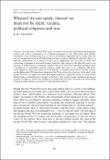Whereof we can speak, thereof we must not be silent : trauma, political solipsism and war
Abstract
In cases such as World War I grief or trauma were nearly universal in the European context and a direct consequence of a political experience of war. This article asks whether widespread social suffering may have a social and political expression that is larger than the sum of traumatised or bereaved individuals. Section 1 explores Martha Nussbaum's theory of emotion, particularly as it relates to grief and compassion and uses this to build two contrasting typologies of grief and trauma. Central to this contrast is the idea that grief, as an emotion, is embedded in a community, while trauma and emotional numbing correspond with a breakdown of community and an isolation, which may give rise to solipsism, The latter would appear to make any notion of social trauma a contradiction in terms. Section 2 draws on the philosopher Wittgenstein's critique in the Philosophical Investigations of his early work in the Tractatus, to argue that even the solipsist exists in a particular kind of social world. This provides a foundation for arguing, in Section 3, that social trauma can find expression in a political solipsism, which has dangerous consequences. Section 4 theorises the relationship between trauma, identity and agency at the international level.
Citation
Fierke , K M 2004 , ' Whereof we can speak, thereof we must not be silent : trauma, political solipsism and war ' , Review of International Studies , vol. 30 , no. 4 , pp. 471-491 . https://doi.org/10.1017/S0260210504006187
Publication
Review of International Studies
Status
Peer reviewed
ISSN
0260-2105Type
Journal article
Collections
Items in the St Andrews Research Repository are protected by copyright, with all rights reserved, unless otherwise indicated.

